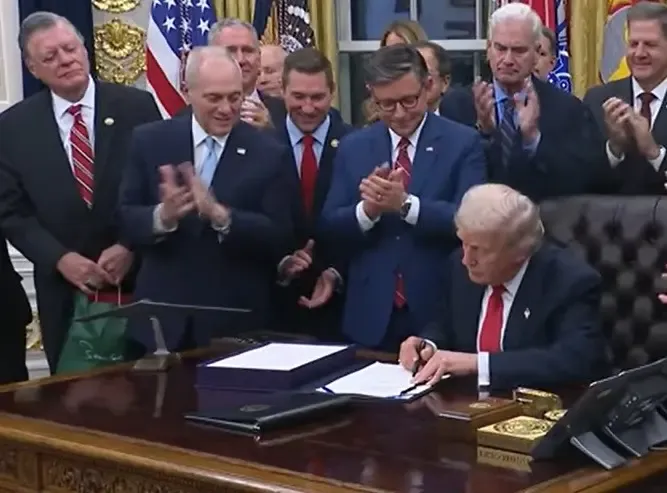Did the Longest US Government Shutdown Really End with Trump's Signature?

Synopsis
Key Takeaways
- The government shutdown lasted 42 days, the longest in U.S. history.
- President Trump signed a temporary funding bill to resume federal operations.
- All federal employees will receive back pay for the duration of the shutdown.
- Republicans and Democrats displayed division over healthcare provisions in the legislation.
- The legislation includes provisions affecting federal prosecutors' access to senators' records.
New York, Nov 13 (NationPress) The longest government shutdown in U.S. history has come to an end with President Donald Trump enacting the legislation approved by Congress to temporarily fund federal operations.
The impasse between the Republicans and Democrats that rendered the government non-functional for 42 days concluded on Wednesday when the House of Representatives voted to endorse the legislation passed by the Senate, thus resolving the deadlock.
This situation marked a setback for the Democrats, as their requests to extend subsidies for the Affordable Care Act, widely known as Obamacare, were not accepted.
“Today is a remarkable day,” Trump stated post-signing, with Republicans viewing this as a victory since they managed to push the bill through Congress without conceding to Democratic demands.
The temporary funding legislation remained stalled in the Senate due to the majority Republican party lacking the 60 votes necessary to advance it for a vote as per procedural requirements.
The deadlock was resolved when eight Democrats sided with Republicans to facilitate a vote on the bill on Monday.
With this development, a variety of federal operations, including air travel and programs providing subsidized or free food for the needy, can now resume, although full functionality may take some time.
All federal employees will receive their back pay, including those who were unable to work during the shutdown.
Some essential workers, such as air traffic controllers and airport security personnel, worked without pay throughout the shutdown.
Addressing next year's Congressional elections and the ramifications of the shutdown, Trump remarked during the signing, “I want to remind the American people not to forget this come midterms.”
In response, House Democrat leader Hakeem Jeffries stated, “Republicans must either choose to extend the Affordable Care Act tax credits this year, or face the consequences in the elections next year.”
According to the legislation, the majority of government operations will receive funding until the end of the year, by which point a budget will need to be finalized.
Funding for certain programs, such as services for retired military personnel and assistance for approximately 42 million individuals in need, will continue until September.
The House votes largely followed party lines with a tally of 222 to 209, including six Democrats supporting the Republican majority and two Republicans opposing it.
While the standoff may have contributed to Republican Party setbacks in recent elections—an acknowledgment from Trump—it also affected Democratic supporters in the federal workforce who were not receiving salaries, along with the vulnerable populations relying on government assistance.
This pressure led some Senate Democrats to favor ending the shutdown.
Democrat Congresswoman Marie Gluesenkamp Perez, who joined Republicans to vote for ending the shutdown, expressed their sentiment: none of her friends dependent on food assistance would prefer to exchange their meals for a vague Washington “messaging victory.”
However, these defections have caused divisions within the party, with some Democrats criticizing Senate leader Chuck Schumer for failing to prevent the breakaway votes.
Trump has hinted at plans to revamp Obamacare, suggesting direct subsidies for eligible individuals rather than funneling them through insurance companies, which he claims enriches the companies while driving their stock prices up.
Buried in the bill is a provision prohibiting federal prosecutors from accessing senators' phone records without notice, establishing penalties of up to $500,000 for violations. This rule is retroactive to 2022 and was introduced following instances of prosecutors examining senators’ phone records during investigations into the January 2021 Capitol protests instigated by Trump supporters during Congress's certification of Joe Biden's election victory.









